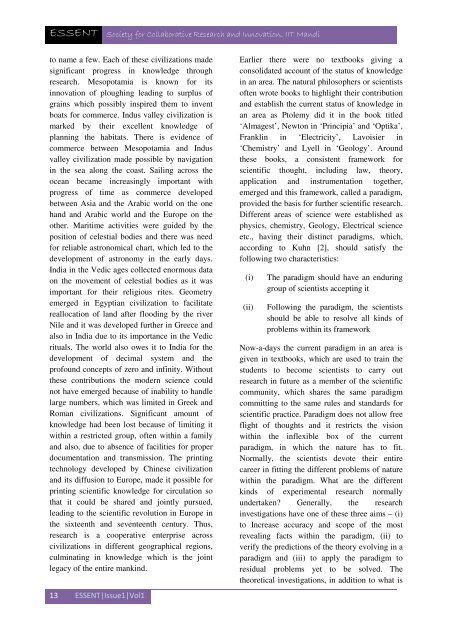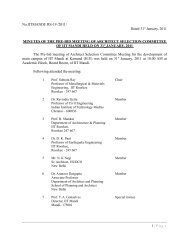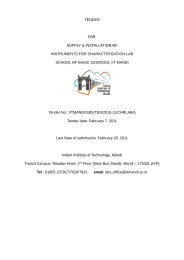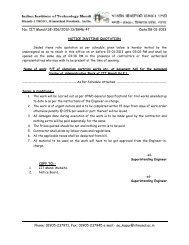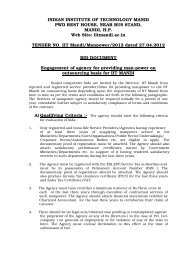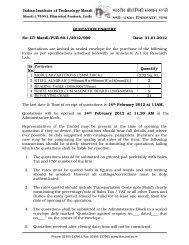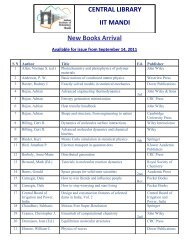Issue1. Vol.1 (April, 2013) - IIT Mandi
Issue1. Vol.1 (April, 2013) - IIT Mandi
Issue1. Vol.1 (April, 2013) - IIT Mandi
- No tags were found...
Create successful ePaper yourself
Turn your PDF publications into a flip-book with our unique Google optimized e-Paper software.
ESSENT Society for Collaborative Research and Innovation, <strong>IIT</strong> <strong>Mandi</strong>to name a few. Each of these civilizations madesignificant progress in knowledge throughresearch. Mesopotamia is known for itsinnovation of ploughing leading to surplus ofgrains which possibly inspired them to inventboats for commerce. Indus valley civilization ismarked by their excellent knowledge ofplanning the habitats. There is evidence ofcommerce between Mesopotamia and Indusvalley civilization made possible by navigationin the sea along the coast. Sailing across theocean became increasingly important withprogress of time as commerce developedbetween Asia and the Arabic world on the onehand and Arabic world and the Europe on theother. Maritime activities were guided by theposition of celestial bodies and there was needfor reliable astronomical chart, which led to thedevelopment of astronomy in the early days.India in the Vedic ages collected enormous dataon the movement of celestial bodies as it wasimportant for their religious rites. Geometryemerged in Egyptian civilization to facilitatereallocation of land after flooding by the riverNile and it was developed further in Greece andalso in India due to its importance in the Vedicrituals. The world also owes it to India for thedevelopment of decimal system and theprofound concepts of zero and infinity. Withoutthese contributions the modern science couldnot have emerged because of inability to handlelarge numbers, which was limited in Greek andRoman civilizations. Significant amount ofknowledge had been lost because of limiting itwithin a restricted group, often within a familyand also, due to absence of facilities for properdocumentation and transmission. The printingtechnology developed by Chinese civilizationand its diffusion to Europe, made it possible forprinting scientific knowledge for circulation sothat it could be shared and jointly pursued,leading to the scientific revolution in Europe inthe sixteenth and seventeenth century. Thus,research is a cooperative enterprise acrosscivilizations in different geographical regions,culminating in knowledge which is the jointlegacy of the entire mankind.13 ESSENT|Issue1|Vol1Earlier there were no textbooks giving aconsolidated account of the status of knowledgein an area. The natural philosophers or scientistsoften wrote books to highlight their contributionand establish the current status of knowledge inan area as Ptolemy did it in the book titled‘Almagest’, Newton in ‘Principia’ and ‘Optika’,Franklin in ‘Electricity’, Lavoisier in‘Chemistry’ and Lyell in ‘Geology’. Aroundthese books, a consistent framework forscientific thought, including law, theory,application and instrumentation together,emerged and this framework, called a paradigm,provided the basis for further scientific research.Different areas of science were established asphysics, chemistry, Geology, Electrical scienceetc., having their distinct paradigms, which,according to Kuhn [2], should satisfy thefollowing two characteristics:(i)(ii)The paradigm should have an enduringgroup of scientists accepting itFollowing the paradigm, the scientistsshould be able to resolve all kinds ofproblems within its frameworkNow-a-days the current paradigm in an area isgiven in textbooks, which are used to train thestudents to become scientists to carry outresearch in future as a member of the scientificcommunity, which shares the same paradigmcommitting to the same rules and standards forscientific practice. Paradigm does not allow freeflight of thoughts and it restricts the visionwithin the inflexible box of the currentparadigm, in which the nature has to fit.Normally, the scientists devote their entirecareer in fitting the different problems of naturewithin the paradigm. What are the differentkinds of experimental research normallyundertaken? Generally, the researchinvestigations have one of these three aims – (i)to Increase accuracy and scope of the mostrevealing facts within the paradigm, (ii) toverify the predictions of the theory evolving in aparadigm and (iii) to apply the paradigm toresidual problems yet to be solved. Thetheoretical investigations, in addition to what is


